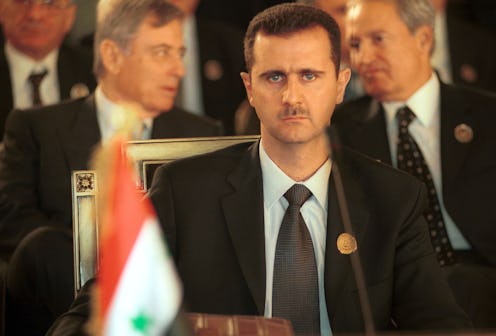News
Syria: Chemical Weapons Agreement is "Victory"
Just one day after Kerry's announcement that the U.S. and Russia have managed to broker a deal to avoid an American missile strike on Syria, Damascus is already calling the agreement a triumph for its country. President Obama has also welcomed the deal — but is keeping the military option on the back-burner, just in case.
"We welcome the agreement," Syrian Reconciliation Minister Ali Haidar said Sunday. "On the one hand, it helps Syria come out of the crisis and, on the other, it helps avoid the war against Syria depriving those who wanted to launch it of arguments to do so."
"It's a victory for Syria achieved thanks to our Russian friends," he added.
In contrast, President Obama has attributed the agreement to the possibility of a military intervention, saying, "In part because of the credible threat of U.S. military force, we now have the opportunity to achieve our objectives through diplomacy."
"This framework provides the opportunity for the elimination of Syrian chemical weapons in a transparent, expeditious, and verifiable manner, which could end the threat these weapons pose not only to the Syrian people but to the region and the world," he added.
But he also said that "the international community expects the Assad regime to live up to its public commitments," cautioning that "there are consequences should the Assad regime not comply with the framework agreed today [...] if diplomacy fails, the United States remains prepared to act."
The Syrian opposition, for their part, remain unconvinced by the deal. The Free Syrian Army leader has rejected the agreement outright, calling it a time-wasting ploy by Russia to buy the Syrian regime some time.
"Frankly there will be no ceasefire with the regime," the leader said.
Senators John McCain and Lindsey Graham are also (unsurprisingly) displeased with the agreement, calling it "an act of provocative weakness on America's part."
"Assad will use the months and months afforded to him to delay and deceive the world using every trick in Saddam Hussein's playbook," they said in a joint statement. "It requires a willful suspension of disbelief to see this agreement as anything other than the start of a diplomatic blind alley, and the Obama Administration is being led into it by Bashar Assad and Vladimir Putin."
In an unrelated development, a different opposition group, the Syrian National Coalition, elected a moderate Islamist, Ahmad Tumeh, as provisional prime minister Saturday. The Prime Minister's goal will be to improve regions of Syria that are no longer under President Bashar al-Assad's control.
"The priority of my government will be to restore stability in the liberated areas, improve their living conditions and provide security," Tumeh told Reuters.
Meanwhile, the United Nations inspectors' report will be released on Monday. While the likelihood is that it'll verify the use of chemical weapons on August 21, it probably won't explicitly identify a perpetrator. It will, however, reportedly confirm that only the Syrian military could have carried out such a large attack — with U.N. Secretary General Ban Ki-Moon saying Friday that it would be "an overwhelming report," adding that the Assad government has "committed many crimes against humanity."
But now that punitive action is pretty much off the table, Assad only has to worry about cataloging his arsenal. Under the agreement, Syria has one week submit a comprehensive listing of its chemical weapons stockpile, and until the middle of 2014 to eliminate it all. You can read the full framework of the deal here.
